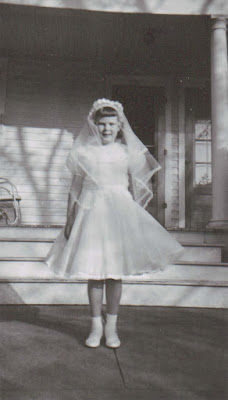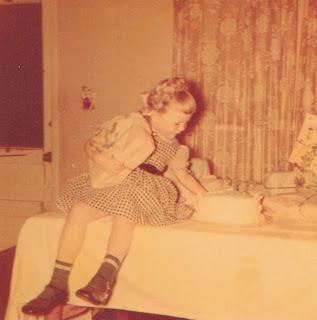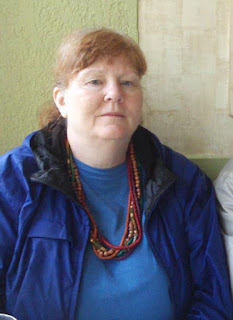Spring: Chubby Child Body
 |
| The author's First Communion -- Age 8 _____________________ |
I
will never criticize a child for being overweight.
No
child ever chooses to carry extra weight – for reasons that are not yet
completely understood, some people are genetically predisposed to carry extra pounds,
and others have a flaw in their appestat which can throw appetite control out
of kilter.
To
blame a child for something that she or he has little control over is cruel and
inhuman, and yet overweight children are harassed by other children and even by
adults who may believe that they have the child’s best interests at heart.
If
any blame can be assigned, let’s point the finger at the fast food industry
that markets unhealthy food to children and, perhaps, the parents who give in
to the incessant marketing.
A
child does not yet have the psychological tools to fend off the blizzard of ads
propagated by the fast food industry.
Hell,
most adults are easily manipulated by cagey advertisements – just look at those
clever beer commercials convincing consumers to drink famous, albeit piss in a
can, beer brands –.
In
the end, it’s up to parents to say “no” to quick fast food meals, to buy healthy
ingredients, and to reserve junk food for occasional treats.
Yeah,
yeah. I know all the arguments: parents are busy and tired after a long day,
and cooking is a hassle (yes, it is), and the kids are whining for pizza – it’s
just so easy to have a meat-lovers’, triple cheese pizza delivered for that
Tuesday night dinner.
I’ve
been there.
But
there are ways to cook healthy and tasty meals without slaving for hours in the
kitchen and encouraging children to snack on whole foods, such as apple slices
and carrot sticks.
In
general, children are bombarded with mixed messages: to fit in, they must eat
what their friends are eating – no one wants to be that kid whose mother sends
a can of tuna to a birthday party because the kid is on a diet. And, yet, if a
child is fat, he or she is likely to be shunned or poked fun at.
A
lose/lose situation.
During
my childhood, junk food and fast food joints were just beginning to dot the
American landscape, so other than Dairy Queen or A&W, these places were
barely on our radar.
My
grandparents, who raised me, rarely stocked empty-calorie foods, such as potato
chips, sugary pop, and ice cream – these foods were reserved for special
occasions: picnics, birthday parties, and holidays.
On
the other hand, we did not eat particularly healthy foods: My grandmother Mo
cooked with lard and bacon grease. When we went out to eat on Friday nights, we
ordered fried fish and French fries – I never experienced grilled or steamed
fish until I was an adult.
We
slathered our iceberg lettuce salads with a mix of ketchup and full-fat
mayonnaise.
While
it may be nostalgic to wax poetic about healthier eating back in the day, don’t
believe it.
It’s
a myth.
The
point is, my body was a constant source of daily discussion and criticism,
mostly by Mo and some of my other family members. The overall message: I was
not okay because of my weight.
I
was a chubby child – not fat, mind you.
Still,
I was teased horribly, mostly by boys, some of them strangers, some of them
family.
I’m not sure why I
became a little chunky and why my grandmother panicked about my weight, except
that in the 1950’s, chubby children were a rarity. Most of my friends were all bony
and angular, rails, with stick arms and legs, and I was rounder and fleshier.
Back then, it was important to fit in and not stand out in a negative way, and any excessive weight was not a positive
attribute.
I suspect that if my
grandmother had not made a huge issue about my weight and made sure that I was
being served healthy foods at meals and allowed to enjoy occasional treats without
all the food drama, I would have grown out of my chubbiness.
Food would have never
become such a persistent aspect of my life.
But back then, the
approach to weight loss was simplistic: you put less fuel in the engine, you
will eventually deplete it. The idea of deprivation and its psychological
effects, especially on children, simply were not widely known or researched.
A long-ago visit to the
doctor’s office has changed my life in a most profound way, launching my 55-year
battle with weight.
In
“Are You Thin Yet?” (an essay I wrote in 1990, published in 1993 in a thematic anthology about
food issues), I explored the pain of my childhood as a chubby girl:
“Are
You Thin Yet?”:
“Are you thin
yet?”
Those words,
arriving one day – cloaked in a birthday card and sizable check from a great
aunt in California – will remain forever grooved in my mind.
So will the words
that followed:
“I hope so
because, if not, you’ll have to spend your birthday money on fat clothes, and
we know how ugly they are. And you
have such a pretty face.”
Happy 13th
birthday.
I’ll never forget
the pain from that cruel and cutting message, perceiving, somehow, that love
and acceptance were doled out according to how close I could get to my ideal
body weight, that fat was a sacrilege, a dirty family secret to be eradicated
like a communicable disease, even if it meant sacrificing a little girl’s
self-esteem.
At 13, I was a
shell-shocked veteran of the diet wars, having already embarked on reducing
regimens, ranging from the downright fad diets (“eat sugar and lettuce for
every meal for one week”) to the downright dangerous (amphetamines prescribed
by my family doctor who himself weighed in at a whopping 300 pounds).
I was an expert in
attack strategies required for tackling those extra pounds, having begun
several years before the vicious cycle of food deprivation, weight loss,
bingeing, weight gain, guilt, more food deprivation, more weight loss, more
bingeing, more weight gain, more guilt, a cycle that has stalked me throughout
my adulthood.
I started picking
up unwanted pounds when I was eight. At first, my family teased me about being
“pleasingly plump” and “a whole lot to love.” Yet, as I look back on old
pictures, I wasn’t overly obese; perhaps I was simply going through a stage
where my height hadn’t yet caught up with my weight.
I’ll never know,
however, because my family would not accept me as I was, and (with the best of
intentions, I’m sure) started me on my diet merry-go-round.
First, they tried
“scare tactics”:
“If you eat those
potato chips, we’ll need a derrick to get you to school.”
Then it was
“let’s-hide-the-food-from-the-kid-and-maybe-she-won’t-notice” approach.
I noticed all
right and took steps to compensate by raiding my piggy bank and sneaking down
to the corner grocery store for Reese’s Peanut Butter cups; I could always
depend upon my good friend chocolate to fill that empty spot in my stomach.
Once, when I was home alone, desperate to fill that void with something warm
and soothing and yet too frightened of fire to light the pilot light on the
stove, I heated Campbell’s Chicken Noodle soup in the electric percolator.
So by the time I
had received the fateful birthday message, I was still not thin, even though my
family and doctor had tried just about everything, including thyroid pills,
even though my thyroid was (and still is) perfectly normal.
By now, the
verdict from my family, peers, and media was obvious:
I was not okay.
I was fat;
therefore, I was stupid, oafish, somehow sub-human, unfit to play with “normal”
children. And they let me know about it, too, calling me “Fatso,” “Jeffer the Heifer,”
“Fatty-fatty, two-by-four, couldn’t-get-through-the bathroom-door.”
I hated myself,
and, even though I was raised in a staunch Catholic family, I once considered
selling my soul to the devil “if only I could eat all the peanut butter cups in
the world and still lose weight.”
Instead, with my
immortal soul intact and my self-esteem shot to hell, I began, in earnest, my
self-imposed cycle of food deprivation, etc.
By high school, I
was still not thin, but my regimen now included days of total fasting, followed
by sheer bouts of gluttony. I was completely out-of-control, and, except for
periods of self-imposed exile into “Dietland,” remained out-of-control on into
adulthood.
In 1986, I
embarked on my last regimented diet, a grueling journey through the Optifast
Program, certainly the hair shirt, the sack cloth and ashes of all programs,
The Ultimate Food Deprivation Diet, the Just Punishment for the Fat, my last
crack at formal self-flagellation: for 12 weeks I ate no solid food, limited to
drinking 70 calorie milk shakes six times a day. During that three months, I
became totally obsessed with food; I counted the days when I could finally put
one bite of poached chicken breast into my mouth; I had sexual dreams about
food, bacchanalian banquets where the line between good taste and raunchy sex
blurred; my senses sharpened, my eyes grew gaunt, my temperament developed a
steely edge.
Was I thin yet?
Of course not,
because the minute I stuck that first bite of real food into my mouth, I was fat again, no matter what the scale
told me.
In a matter of
weeks, I was fat again, simply
reinforcing what my head had known for years.
I finally gave
into my old enemy food, eating whatever I wanted, feeling guilty after every
bite and every binge, hating myself more and more. I was mired in a four-year
feeding frenzy.
August, 1990: I found myself facing
40 – and still not thin yet.
For the first time
in my life, I actually considered suicide; however fleeting the thought might
have been, the possibility was frightening enough to send me scurrying for
professional help. I know this revelation will shock my loved ones, including
my husband, but I have to tell my story like it is.
Two months later,
after receiving some excellent psychotherapy in conjunction with a workshop on
overcoming food obsession, I’m finally coming to terms with my love/hate
relationship with food. Most importantly, I’m discovering that I need to learn
how to love and accept myself – no matter what my weight is and no matter what
others (including my family) think about me – unconditionally and without
reservation.
I’m not quite
there yet, but for the first time in my life, I feel hope, real hope.
Sometime in late
September–I’m not exactly sure why or how–I made a decision to toss away all
the diet baggage I’ve been carrying around for all these years. Now I ignore
all the diet gurus and their snake oil remedies and have vowed to get on with
the rest of my life.
Also, I have given
myself unconditional permission to enjoy the foods I love, in whatever
quantities I desire, and whenever I want – guilt-free. Moreover, I have called
a moratorium on foods I never really liked in the first place but felt I had to
eat because they were “thin” foods for “unthin” people.
In essence, I have
thrown out all the old diet rules. After all, generally speaking, people who
are naturally slender and have a positive self-image don’t put themselves
through a lifetime of agony over food.
And, now, neither
will I.
Am I thin yet? No,
but, hey, I’m a heck of a lot happier now than at any other point in my life.
Even at slightly under 200 pounds, I am able to look at myself in the mirror
and see someone I could genuinely like – even love.
Will I ever be
thin?
I honestly don’t
know. I do know that ever since I
have purged myself of useless guilt, I have not binged. I’m not sure what
significance this has in the long term, but I now realize that my future
success must be measured in the way I feel about myself, not by the scale or
public consensus.
I
wish I could say I have lived the second part of my essay, but I have never
been able to reconcile what I wanted
to believe about throwing off all diet rules with my actual body and reality.
So
what happened after I made the momentous decision to give myself “unconditional
permission to enjoy the foods I love, in whatever quantities I desire, and
whenever I want – guilt-free”?
I
ballooned to 230 pounds.
At the time of this
essay, I had bought into the anti-dieting movement and was determined never to
diet again.
Of course, that didn’t
happen; the siren song of thinness kept calling. I eventually took up dieting
again, off and on. It simply didn’t occur to me I was dieting all wrong – that
I was approaching it as temporary nuisance.
In the past few years, I
have had to redefine the very word “diet” to mean “permanent lifestyle change,”
not as a temporary state to be endured until I could eat that piece of pecan
pie again. Now I realize that I can have a slimmer body and eat my pie.
Don’t get me wrong.
While I no longer agree with every aspect of the anti-diet movement, it does
offer some important positive messages:
Celebrate yourself and your accomplishments, no matter what you
weigh, and live life in the present – the only advice I can offer to others.
I’ll never allow others
to define how I should feel about myself and my body. If they define me by my
weight, then it’s their problem, not mine.
I am fortunate that The
Worst Diet in the World did not turn me into an amphetamine addict; in fact, it
may have had the opposite effect, for, in general, I abhor pills and only take
them when I absolutely must.
Had I been another kind
of person, the consequences could have been dire, but instead of turning to
pills, cigarettes, or alcohol, I turned to food.
I no longer blame my grandmother
or even the doctor for The Worst Diet in the World; the best science of the
time indicated that diet pills could help overweight people, including
children, lose weight.
I know my grandmother
loved me and wished only the best for my welfare; she simply did not have any
experience in dealing with overweight children, so when my doctor prescribed
thyroid pills and amphetamines, she accepted his professional diagnosis and
treatment.
Any success is all up to
me now, and I have chosen to move forward and to look back only when I can
learn something from the past, not to assign blame.
____________________________
(Acknowledgment: “Are You Thin Yet?” originally
appeared in Eating Our Hearts Out: Personal Accounts of Women’s Relationship
with Food, edited by Lesléa Newman, The Crossing Press, 1993:204-206.)







Comments